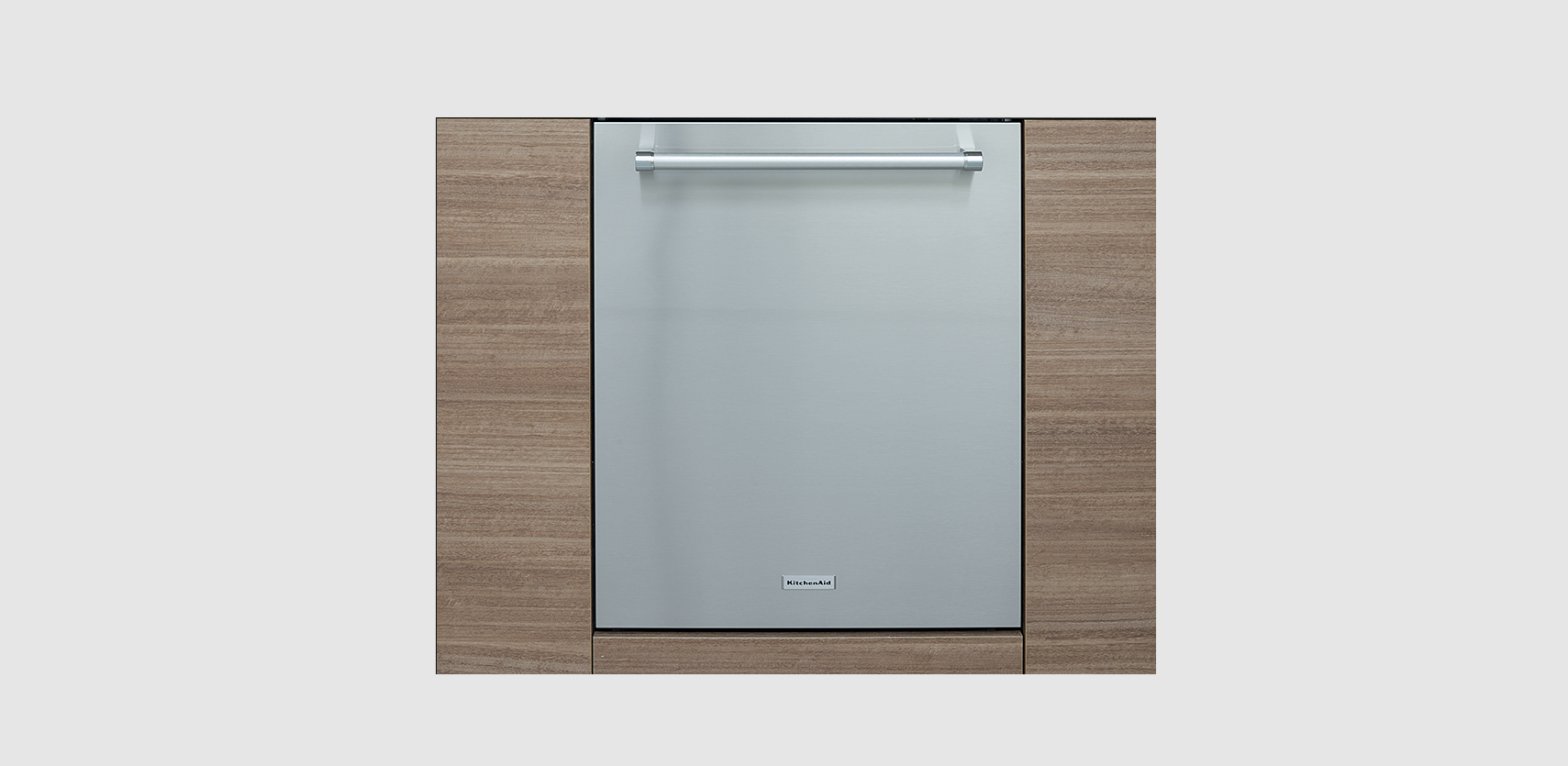KitchenAid Dishwasher
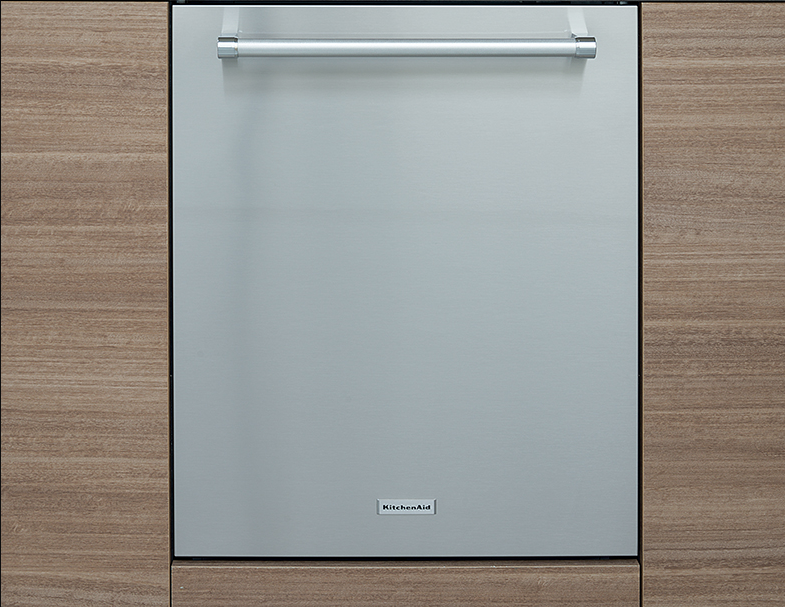
KitchenAid Dishwasher
LEARN MOREIn an effort to conserve natural resources, this dishwasher includes a condensed User Guide. Complete User Instructions can be downloaded at www.kitchenaid.com/customer-service/manuals.
For future reference, please make a note of your product model and serial numbers. These can be located on a label in the tub along the left outer edge.
Model Number________________________________ Serial Number______________________________________
Register your dishwasher at www.kitchenaid.com. In Canada, register your dishwasher at www.kitchenaid.ca.
Your safety and the safety of others are very important. We have provided many important safety messages in this manual and on your appliance. Always read and obey all safety messages.
 This is the safety alert symbol. This symbol alerts you to potential hazards that can kill or hurt you and others. All safety messages will follow the safety alert symbol and either the word “DANGER” or “WARNING.”These words mean:
This is the safety alert symbol. This symbol alerts you to potential hazards that can kill or hurt you and others. All safety messages will follow the safety alert symbol and either the word “DANGER” or “WARNING.”These words mean:




DANGER: You can be killed or seriously injured if you don’t immediately follow instructions.




You can be killed or seriously injured if you don’t follow instructions. All safety messages will tell you what the potential hazard is, tell you how to reduce the chance of injury, and tell you what can happen if the instructions are not followed.
IMPORTANT SAFETY INSTRUCTIONS
WARNING: When using the dishwasher, follow basic precautions, including the following:
- Read all instructions before using the dishwasher.
- Use the dishwasher only for its intended function.
- Use only detergents or rinse agents recommended for use in a dishwasher, and keep them out of the reach of children.
- When loading items to be washed:
- Locate sharp items so that they are not likely to damage the door seal.
- Load sharp knives with the handles up to reduce the risk of cut-type injuries.
- Do not wash plastic items unless they are marked “dishwasher safe” or the equivalent. For plastic items not so marked, check the manufacturer’s recommendations.
- Do not touch the heating element during or immediately after use.
- Do not operate the dishwasher unless all enclosure panels are properly in place.
- Do not tamper with controls.
- Do not abuse, sit on, or stand on the door, lid, or dish racks of the dishwasher.
- To reduce the risk of injury, do not allow children to play in or on the dishwasher.
- Under certain conditions, hydrogen gas may be produced in a hot water system that has not been used for two weeks or more. HYDROGEN GAS IS EXPLOSIVE. If the hot water system has not been used for such a period, before using the dishwasher turn on all hot water faucets and let the water flow from each for several minutes.
- This will release any accumulated hydrogen gas. As the gas is flammable, do not smoke or use an open flame during this time.
- Remove the door or lid to the washing compartment when removing an old dishwasher from service or discarding it.
SAVE THESE INSTRUCTIONS
State of California Proposition 65 Warnings: WARNING: This product contains one or more chemicals known to the State of California to cause cancer. WARNING: This product contains one or more chemicals known to the State of California to cause birth defects or other reproductive harm.


Tip Over Hazard
- Do not use dishwasher until completely installed.
- Do not push down on open door.
- Doing so can result in serious injury or cuts.
GROUNDING INSTRUCTIONS
- For a grounded, cord-connected dishwasher: The dishwasher must be grounded. In the event of a malfunction or breakdown, grounding will reduce the risk of electric shock by providing a path of least resistance for electric current. The dishwasher is equipped with a cord having an equipment-grounding conductor and a grounding plug. The plug must be plugged into an appropriate outlet that is installed and grounded in accordance with all local codes and ordinances. WARNING: Improper connection of the equipment-grounding conductor can result in a risk of electric shock. Check with a qualified electrician or service representative if you are in doubt whether the dishwasher is properly grounded. Do not modify the plug provided with the dishwasher; if it will not fit the outlet, have a proper outlet installed by a qualified electrician.
- For a permanently connected dishwasher:The dishwasher must be connected to a grounded metal, permanent wiring system, or an equipment-grounding conductor must be run with the circuit conductors and connected to the equipment-grounding terminal or lead on the dishwasher.
SAVE THESE INSTRUCTIONS
KEY USAGE TIPS
Filtration system and maintenance Your dishwasher has the latest technology in dishwasher filtration. This filtration system minimizes sound and optimizes water and energy conservation while providing superior cleaning.
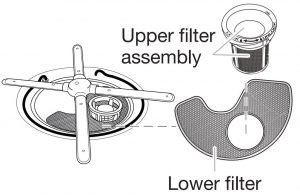

The filter system consists of two parts, an upper filter assembly and lower filter.
IMPORTANT: To avoid damage to dishwasher, do not operate your dishwasher without filters properly installed. Be sure lower filter is securely in place and upper filter assembly is locked into place. If upper assembly turns freely, it is not locked into place.
The filters may need to be cleaned when:
- Visible objects or soils are on upper filter assembly.
- Dishes feel gritty to the touch.
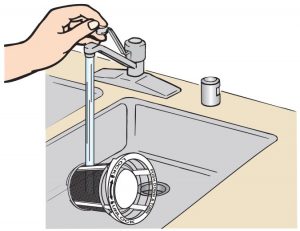

See the “Filtration System” section in the full online User Instructions for complete removal and maintenance schedule.
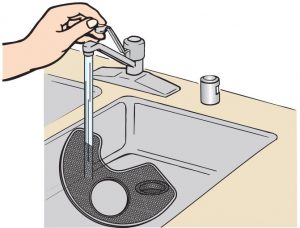

Drying – Rinse aid is essentialYou must use a drying agent such as a rinse aid for good drying performance. Rinse aid along with the Heat Dry, Extended Heat Dry option will provide best drying and avoid excessive moisture in dishwasher interior.
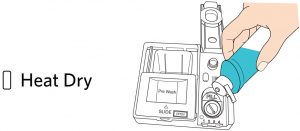

![]()
![]()
Energy efficiency is gained by extending cycle time and reducing the amount of wattage and water used during your dishwasher’s cycle. For exceptional cleaning, cycles are longer due to the soak and pauses.
Efficient dishwashers run longer to save water and energy, just as driving a car slower saves on gas. Your first cycle will run longer to calibrate the optical water sensor.
Premium Top Rack AdjusterYou can raise or lower the top rack to fit tall items in either the top or bottom rack. Adjusters are located on each side of the top rack.
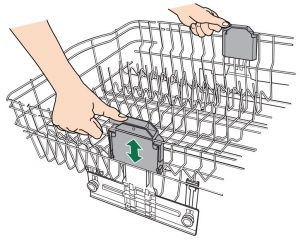

To raise the rack:Press both rack adjuster thumb levers and lift the rack until it isin the up position and level.
To lower the rack:Press both rack adjuster thumb levers and slide the rack to its down position and level.
NOTE: The top rack must be level.
Touch START/RESUME every time you add a dish
IMPORTANT: If anyone opens the door (such as, for adding a dish, even during the Delay option), Start/Resume must be touched each time to resume the cycle.


Push the door firmly closed within 4 seconds of touching Start/Resume. If the door is not closed within 4 seconds, the Start keypad light will flash, an audible tone will be heard, and the cycle will not start.
OPERATING YOUR DISHWASHER
- Prepare and load the dishwasher
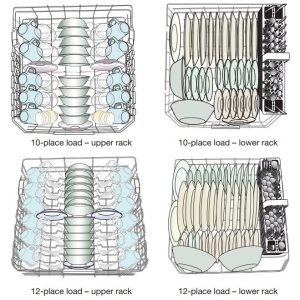

IMPORTANT: Remove leftover food, bones, toothpicks, and other hard items from dishes. Remove labels from containers before washing.
- Make sure when the dishwasher door is closed no items are blocking detergent dispenser.
- Items should be loaded with soiled surfaces facing down and inward to the spray as shown in the graphics above. This will improve cleaning and drying results. Angle dirtiest dish surface downward, allowing space for water to flow up through rack and between dishes.
- Avoid overlapping items, like bowls or plates that may trap food.
- Place plastics, small plates, and glasses in upper rack.
- Wash only items marked “dishwasher safe.”
- To avoid thumping/clattering noises during operation, load dishes so they do not touch one another. Make sure lightweight load items are secured in racks.
- Use the slots in the covers and suggested loading patterns to keep your silverware separated for optimum wash.
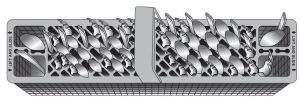

- If your silverware does not fit into the designated slots, lift and slide covers off to remove them and mix silverware types to keep them separated.
- When loading silverware, always place sharp items pointing down and avoid “nesting”as shown.
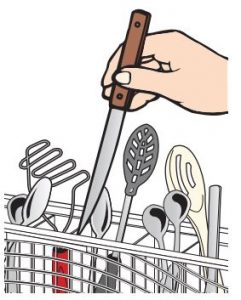

2. Check that all arms spin freely Items in the rack can block the spray arms.
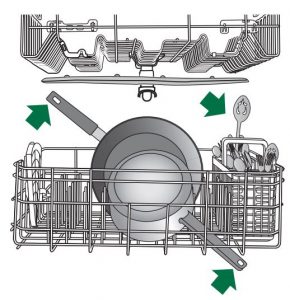

3. Add detergentPremeasured Detergents
High-quality premeasured tablets and packs are recommended for improved performance.
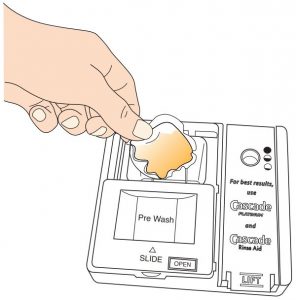

Quality tablets and packs have been proven better than powder, liquid, or gel detergents at reducing filming on dishes. Using tablets and packs over time will start to reduce or eliminate white film. They are suitable for all water hardness and soil levels. Also, by using a rinse aid, you can minimize repeat buildup of white film (not all packs and tablets contain rinse aid). Always place premeasured detergents in main compartment and close lid.
NOTE: Follow instructions on the package when using other dishwasher detergent types. See the complete User Instructions for more details about powders, liquids, and gels.
- Use automatic dishwasher detergent only. Add detergent just before starting a cycle.
- Fresh automatic dishwasher detergent results in better cleaning. Store tightly closed detergent container in a cool, dry place.
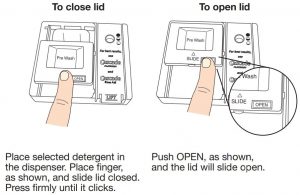

4. Add rinse aid
- Your dishwasher is designed to use rinse aid for good drying performance. Without rinse aid, your dishes and dishwasher interior will have excessive moisture. The heating and drying options will not perform as well without rinse aid.
- Rinse aid keeps water from forming droplets that can dry as spots or streaks. It also improves drying by allowing water to drain off of dishes after final rinse. Rinse aid does not adhere to dishware, and when used, it is dispensed during each cycle.
- To add rinse aid, open the dispenser lid by gently pushing in the center of the lid with your thumb while lifting up on the edge.
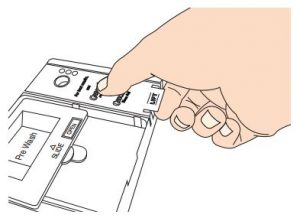

- Pour rinse aid into the opening until the indicator level shows that it is full.
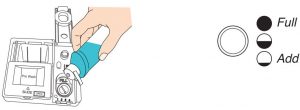

- Close dispenser by pushing down gently on the lid.NOTE: For most water conditions, the factory setting will give good results.
If you are experiencing poor drying performance, try a higher setting. Turn the arrow adjuster to the next higher number to increase the amount of rinse aid.
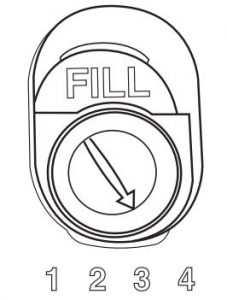

5. Select a cycleEfficient dishwashers run longer to save water and energy, just as driving a car slower saves on gas. Typical cycle time is approximately 21/2 hours but can take less or more time to complete depending on selections. Push door firmly closed and touch START to repeat the same cycle and options as in the previous wash cycle, or select another cycle appropriate for your load. See the Cycle Guide.
6. Select optionsYou can customize your cycles by selecting the options desired. See the Cycle Guide. If you change your mind, touch the option keypad again to turn off the option. Not all options are available for every cycle. If an invalid option is selected for a given cycle, the lights will flash. Adding options may increase the cycle time.
7. Start or resume a cycleNOTE: If needed, run hot water at the sink nearest your dishwasher until water is hot. Turn off water. With door firmly closed, touch START. IMPORTANT: If the door is opened for more than a few seconds after the cycle is started (even during the Delay time), the Start keypad must be touched again after the door is closed. If Start keypad is not touched, the Start keypad light with flash, and audible tone will be heard, and cycle will not resume.
8. Follow the progress of your dishwasherThe display will indicate cycle progress such as Washing, Drying, Clean, and Sanitized. The cycle has completed when the Clean light is lit. Refer to the Control chart in the Cycle Guide section for operation of the Sanitized indicator.
CYCLE GUIDE
IMPORTANT: The sensor in your dishwasher monitors the soil level. Cycle time and/or water usage can vary as the sensor adjusts the cycle for the best wash performance. If the incoming water is less than the recommended temperature or food soils are heavy, the cycle will automatically compensate by adding time, heat, and water as needed.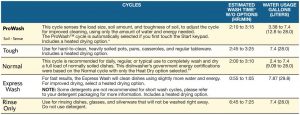

**No other washing and drying temperature options were selected, and the dishwasher was not subjected to truncated testing. Rinse aid was not used, and there was no detergent used in the prewash.
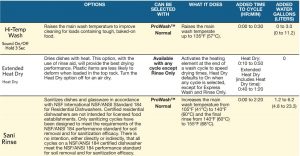

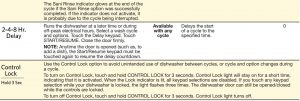

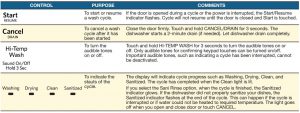

DISHWASHER CARE
Cleaning the ExteriorClean the exterior of the dishwasher with only a soft, damp cloth, and mild detergent. If your dishwasher has a stainless steel exterior, it may have a coating that is resistant to fingerprints. Avoid using abrasive cleaning products on the exterior of the dishwasher.
Cleaning and Maintaining the InteriorMany detergents may leave white spots or a white residue on dishware and on the interior of the dishwasher. Over time this residue can become unsightly and could affect dishwasher performance. Use of a dishwasher cleaning product, such as affresh® Dishwasher Cleaner, can help to remove the residue. Monthly use of affresh® Dishwasher Cleaner is recommended to help maintain the dishwasher. Follow package directions.
NOTE: KitchenAid recommends the use of high-quality, premeasured detergent tablets or packs and the use of rinse aid for dishwasher cleaning and daily care.
If you have a drain air gap, check and clean it if the dishwasher isn’t draining well.
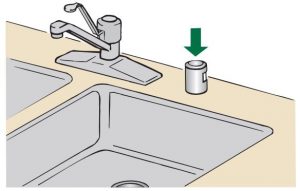

To Reduce Risk of Property Damage During Vacation or Extended Time Without Use:
- When you will not be using the dishwasher during the summer months, turn off the water and power supply to the dishwasher.
- Make sure the water supply lines are protected against freezing conditions. Ice formations in the supply lines can increase water pressure and cause damage to your dishwasher or home. Damage from freezing is not covered by the warranty.
- When storing your dishwasher in the winter, avoid water damage by having your dishwasher winterized by authorized service personnel.
TROUBLESHOOTING
First try the solutions suggested here. If you need further assistance or more recommendations that may help you to avoid a service call, refer to the warranty page in this manual or visit producthelp.kitchenaid.com. In Canada, visit kitchenaid.ca. For internet connectivity questions, in the U.S.A. or Canada, call 1-877-559-2603.
Contact us by mail with any questions or concerns at the address below:
In the U.S.A.:KitchenAid Brand Home AppliancesCustomer eXperience Center553 Benson RoadBenton Harbor, MI 49022-2692
In Canada:KitchenAid Brand Home AppliancesCustomer eXperience Centre200 – 6750 Century Ave.Mississauga, Ontario L5N 0B7
Please include a daytime phone number in your correspondence.
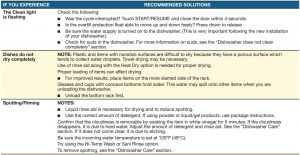







IF YOU NEED SERVICE:
- Before contacting us to arrange service, please determine whether your product requires repair. Some questions can be addressed without service. Please take a few minutes to review the Troubleshooting section of the Use and Care Guide or visit producthelp.kitchenaid.com.
- All warranty service is provided exclusively by our authorized KitchenAid Service Providers. In the U.S. and Canada, direct all requests for warranty service to:
KitchenAid Customer eXperience Center In the U.S.A., call 1-800-422-1230. In Canada, call 1-800-807-6777. If outside the 50 United States or Canada, contact your authorized KitchenAid dealer to determine whether another warranty applies.
LIFETIME LIMITED WARRANTY
WHAT IS COVERED
FIRST YEAR LIMITED WARRANTY (PARTS AND LABOR) For one year from the date of purchase, when this major appliance is installed, operated, and maintained according to instructions attached to or furnished with the product, KitchenAid brand of Whirlpool Corporation or Whirlpool Canada LP (hereafter “KitchenAid”) will pay for factory specified replacement parts and repair labor to correct defects in materials or workmanship that existed when this major appliance was purchased or, at its sole discretion, replace the product. In the event of product replacement, your appliance will be warranted for the remaining term of the original unit’s warranty period.
SECOND THROUGH FIFTH YEAR LIMITED WARRANTY (CERTAIN COMPONENT PARTS ONLY – LABOR NOT INCLUDED)In the second through fifth years from the date of original purchase, when this major appliance is installed, operated, and maintained according to instructions attached to or furnished with the product, KitchenAid will pay for factory specified replacement parts for the following components to correct non-cosmetic defects in materials or workmanship in these parts that prevent function of this major appliance and that existed when this major appliance was purchased. This is a limited five year warranty on the below named parts only and does not include repair labor.
- Nylon dish racks
- Electronic controls
LIFETIME LIMITED WARRANTY (STAINLESS STEEL TUB AND INNER DOOR LINER ONLY)
For the lifetime of the product from the date of original purchase, when this major appliance is installed, operated, and maintained according to instructions attached to or furnished with the product, KitchenAid will pay for factory specified replacement parts and repair labor for the following components to correct non-cosmetic defects in materials or workmanship that existed when this major appliance was purchased:
- Stainless steel tub
- Inner door liner
YOUR SOLE AND EXCLUSIVE REMEDY UNDER THIS LIMITED WARRANTY SHALL BE PRODUCT REPAIR AS PROVIDED HEREIN. Service must be provided by a KitchenAid designated service company. This limited warranty is valid only in the United States or Canada and applies only when the major appliance is used in the country in which it was purchased. This limited warranty is effective from the date of original consumer purchase. Proof of original purchase date is required to obtain service under this limited warranty.
WHAT IS NOT COVERED
- Commercial, non-residential, multiple-family use, or use inconsistent with published user, operator, or installation instructions.
- In-home instruction on how to use your product.
- Service to correct improper product maintenance or installation, installation not in accordance with electrical or plumbing codes, or correction of household electrical or plumbing (e.g., house wiring, fuses, or water inlet hoses).
- Consumable parts (e.g., light bulbs, batteries, air or water filters, preservation solutions).
- Defects or damage caused by the use of non-genuine KitchenAid parts or accessories.
- Damage from accident, misuse, abuse, fire, floods, acts of God, or use with products not approved by KItchenAid.
- Repairs to parts or systems to correct product damage or defects caused by unauthorized service, alteration, or modification of the appliance.
- Cosmetic damage including scratches, dents, chips, and other damage to the appliance finishes, unless such damage results from defects in materials and workmanship and is reported to KitchenAid within 30 days.
- Discoloration, rust, or oxidation of surfaces resulting from caustic or corrosive environments including, but not limited to, high salt concentrations, high moisture or humidity, or exposure to chemicals.
- Pickup or delivery. This product is intended for in-home repair.
- Travel or transportation expenses for service in remote locations where an authorized KitchenAid servicer is not available.
- Removal or reinstallation of inaccessible appliances or built-in fixtures (e.g., trim, decorative panels, flooring, cabinetry, islands, countertops, drywall) that interfere with servicing, removal, or replacement of the product.
- Service or parts for appliances with original model/serial numbers removed, altered, or not easily determined.
The cost of repair or replacement under these excluded circumstances shall be borne by the customer.
DISCLAIMER OF IMPLIED WARRANTIESIMPLIED WARRANTIES, INCLUDING ANY IMPLIED WARRANTY OF MERCHANTABILITY OR IMPLIED WARRANTY OF FITNESS FOR A PARTICULAR PURPOSE, ARE LIMITED TO FIVE YEARS OR THE SHORTEST PERIOD ALLOWED BY LAW. Some states and provinces do not allow limitations on the duration of implied warranties of merchantability or fitness, so this limitation may not apply to you. This warranty gives you specific legal rights, and you also may have other rights that vary from state to state or province to province.
DISCLAIMER OF REPRESENTATIONS OUTSIDE OF WARRANTYKitchenAid makes no representations about the quality, durability, or need for service or repair of this major appliance other than the representations contained in this warranty. If you want a longer or more comprehensive warranty than the limited warranty that comes with this major appliance, you should ask KitchenAid or your retailer about buying an extended warranty.
LIMITATION OF REMEDIES: EXCLUSION OF INCIDENTAL AND CONSEQUENTIAL DAMAGESYOUR SOLE AND EXCLUSIVE REMEDY UNDER THIS LIMITED WARRANTY SHALL BE PRODUCT REPAIR AS PROVIDED HEREIN. KITCHENAID SHALL NOT BE LIABLE FOR INCIDENTAL OR CONSEQUENTIAL DAMAGES. Some states and provinces do not allow the exclusion or limitation of incidental or consequential damages, so these limitations and exclusions may not apply to you. This warranty gives you specific legal rights, and you also may have other rights that vary from state to state or province to province.
DOWNLOAD RESOURCES
- KitchenAid Dishwasher User Manual –
- KitchenAid Dishwasher User Manual –
FAQ’S
KitchenAid and Bosch dishwashers are both excellent and offer good value for the money. But aside from similarities in the wash cycle options and their stainless steel interiors, Bosch dishwashers edge out KitchenAid in design, functionality, cleaning performance, reliability, and even price.
To reset the dishwasher control panel, it needs to be disconnected from the power source for one minute. If your dishwasher is plugged into an outlet, simply unplug the unit for one minute and then plug the unit back in.
To invoke a Diagnostics Cycle, press the “Heated Dry” key followed by the “Normal” key then again the “Heated Dry” key and finally “Normal” key, once more. Ensure your machine is in standby mode while doing it (and press the keys rapidly).
You can reset it by pressing two buttons on the front of the dishwasher at least five times each for a grand total of ten presses. The dishwasher door must be fully closed while the buttons are both pressed.
Loading issues are one of the most common reasons a KitchenAid dishwasher leaves dishes dirty. Overcrowding the racks restricts access to water and detergent so dishes don’t get clean. Allowing items to block the spray arms or detergent dispenser can further limit water and detergent access.
It is normal for the Clean light to stay on after the cycle is complete. The Clean light is an indication that the dishwasher has been run and the dishes inside it are clean. Once the door is opened after the cycle is complete, the light will shut off.
Most all automatic dishwashers KitchenAid included come with a filter system inside the dishwasher to catch any food debris before it has a chance to clog your drains. The filter is in the bottom center of the dishwasher beneath the bottom rack and requires periodic cleaning to ensure free flow of the drain.
Under the locating tabs in the bottom of the dishwasher. Insert. The upper filter assembly into the circular opening in the lower filter slowly rotate the upper filter assembly clockwise.
The dishwasher filter is at the bottom of your dishwasher, under the bottom rack. To find it, pull out the bottom dish rack, then look for the filter it’s usually either in one of the back corners of the dishwasher tub or around the base of the bottom spray arm.
It’s likely the result of a full garbage disposal that won’t allow the drain water to enter from the machine, so it backs up in the bottom of the dishwasher. Barring that, the problem is probably a kink in the drain hose, or a clog in the hose, the drain, or the air gap.
A Normal cycle doesn’t use extra water, longer cleaning times, or hotter temperatures, making it ideal for dishes and glassware without excessive soiling. Overall, this is the best dishwasher cycle to use for dishes that have an average amount of daily dirt and grime
Uses your dishwasher’s full power to get lightly soiled dishes clean in about half the time. Depending on your dishwasher, a Quick Wash cycle can take anywhere from 20 minutes, to about an hour.
VIDEO

[xyz-ips snippet=”download-snippet”]

